Classical Music’s Humanist Strands
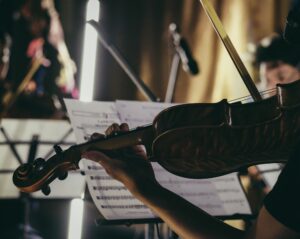 Photo by Julio Rionaldo on Unsplash
Photo by Julio Rionaldo on Unsplash The creative impulse is inspired by a multitude of experiences. Music has long served as an outlet of that creativity. In virtually every culture, music has been a key component to humanity’s expression of love, sorrow, joy, pain, awe, wonder—really, any emotion that makes us, well, Human.
One such source of musical inspiration over the ages has been from the realm of religion. From Gregorian chants to Requiems to congregational hymnody, classically conceived music has been a mainstay in the religious expression of many faith traditions.
One need only to spend some time listening to Bach’s Mass in B minor; Messiah by Handel; or Haydn’s The Creation—among countless other examples—to understand the significant connection between classical music and religious expression.
When exploring the inspiration for works of classical music, it is important to be careful not to assume that only a faith perspective can spark the imagination that brings forth great musical masterpieces.
Throughout the history of what we know as classical music, there have been composers inspired to create for many other reasons than religion or faith. A review of some of the more well-known nontheistic composers and their work offers important insight into the wide-ranging sources that fill the repertoire we know as “classical music.”
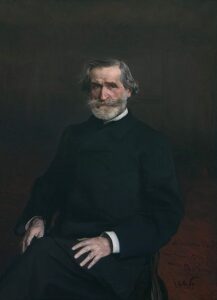
Giuseppe Verdi
Giuseppe Verdi (1813-1901) was regarded as the preeminent Italian composer of his generation. His contributions to the musical canon are still very much beloved and performed often. Growing up in early 19th-century Italy, he was heavily exposed to the Catholic faith. He even began his musical education at his local village church at about age seven.
In addition to his contributions to the musical world, he was very much a humanitarian. He supported schools and hospitals that were not connected to the Church. And, as a part of his will, he left a sizable gift to the city of Milan to establish a retirement home for musicians of limited means. This home is still in operation today!
And yet, John Rosselli in his biography The Life of Verdi, writes, “Like many 19th-century artists, Verdi was an agnostic whose elevated sense of morality and duty bypassed divine sanction. Strepponi (his second wife), replying in 1871 to a friend bent on Verdi’s conversion, at first wrote that, with the highest virtues, her husband was an atheist; she then revised this to ‘I won’t say atheist, but certainly very little of a believer.’”
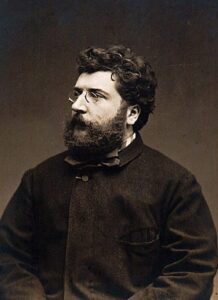
Georges Bizet
Georges Bizet (1838-1875) was a musical prodigy who entered the Conservatoire de Paris at age nine. Bizet was a gifted pianist having won many prestigious performance prizes during his teen years, including the Prix de Rome. But he opted to focus on composing rather than a career as a performer.
During his formative years, French culture was very much influenced by religion and Bizet wrestled with his religious and philosophical views. At one point, when he was asked to compose a Mass, he replied, “I don’t want to write a mass before being in a state to do it well, that is a Christian. I have therefore taken a singular course to reconcile my ideas with the exigencies of Academy rules. They ask me for something religious; very well, I shall do something religious, but of the pagan religion” (Georges Bizet: His Life and Work by Winton Dean, 1965).
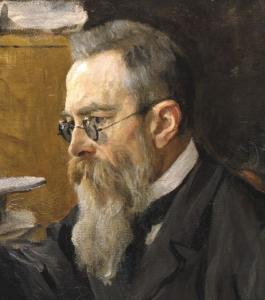
Nikolai Rimsky-Korsakov
Nikolai Rimsky-Korsakov (1844-1908) began his musical career in the 1860’s and was a member of group of composers known as the “Mighty Handful.” This group’s goal was to establish a Russian national style of music. Other members were Balakirev (the leader), Mussorgsky, Borodin, and Cui.
A prodigious composer, his most well-known works include Scheherazade, the Russian Easter Festival overture, and Capriccio espagnol. His work output includes fifteen operas, ninety songs, fifteen chamber works, and twenty other orchestral pieces.
In a Guardian article about the Mighty Handful, the writer relays the following regarding his opera, Kitezh: Vladimir Belsky, the librettist, initially wanted the new work to “be based entirely on the life of Saint Fevroniya of Murom,” but Rimsky-Korsakov “rejected such explicitly Christian subject matter and insisted that the story…be combined with elements of Russian history and a strong dose of pantheistic legend.”
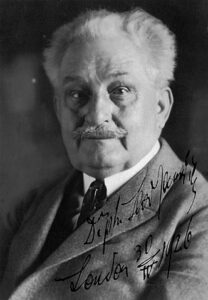
Leoš Janáček
Leoš Janáček (1854-1928) was baptized as a Catholic at the age of eleven and had choral, organ, and piano training through the Abby of St. Thomas in Brno. At age twenty he enrolled in the Prague Organ School. He composed many orchestral, chamber, and vocal works—even some church music. Additionally, he made periodic use of folk songs and dances in his compositions.
Janáček generally rejected traditional religious beliefs. In a letter he wrote to his wife in 1918, he noted that a colleague he was working with “believes in the soul and in its wandering, and I know that all is just a process of life which ends so quickly—and there is no continuation. And, I’d like now to live long.” In correspondence to Kamila Stösslová in 1928 in which he commented on the consecration of new church bells, he wrote, “Today they are lifting the bells into the tower. It would be nice if they weren’t calling people to bamboozling” (The riddle of life: The letters of Leoš Janáček to Kamila Stösslová, 1990).
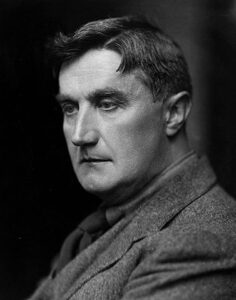
Ralph Vaughan Williams
Ralph Vaughan Williams (1872-1958) attended the Royal College of Music from 1890 to 1892. He later earned a music degree from Trinity College, Cambridge in 1894. He also was awarded a degree in history in 1895. It’s worthy of note that he also studied with Max Bruch and Maurice Ravel.
His musical compositions ranged from orchestras to chamber music to operas, and even hymns. Some of his most loved pieces include Fantasia on a Theme by Thomas Tallis, The Lark Ascending, and Fantasia on Greensleeves. He wrote nine symphonies, including A Sea Symphony, Pastoral Symphony, and Symphony No. 4.
In her biography of her husband, Ursula Vaughan Williams noted, “He was an atheist during his later years at Charterhouse and at Cambridge, though he drifted into a cheerful agnosticism: he was never a professing Christian.”
Vaughan Williams was a great-nephew of Charles Darwin as his paternal grandmother was Darwin’s sister. There’s a story that she told the young Ralph, “The Bible tells us that God made the world in six days. Great Uncle Charles thinks it took rather longer.”
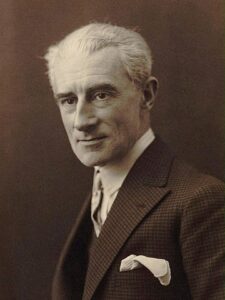
Maurice Ravel
Maurice Ravel (1875 -1937) attended the Conservatoire de Paris, France’s premier music academy, even studying with Gabriel Fauré for a time. He clashed with the school’s leadership and was actually kicked out twice!
Ravel was a master of orchestration and in the 1920s and 30s was considered by many to be France’s greatest living composer. As noted in a 1914 article in the French magazine Comoedia illustré, there’s “a notable absence of religious forms or references” in his works. “His habitual inspiration came from nature, from fairy tales and folk songs, and from classical and Oriental legends. Nor was he always sympathetic to the religious works of other composers.”
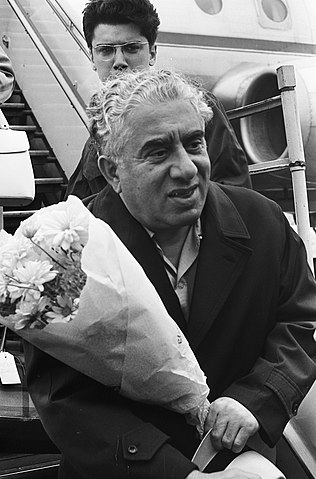
Aram Khachaturian
Aram Khachaturian (1903-1978) is considered one of the three greatest composers of Soviet Russia and its republics, together with Dmitri Shostakovich and Sergei Prokofiev. His initial musical education was at the Gnessin Musical Institute, and he later studied at the Moscow Conservatory.
His Piano Concerto in D-flat Major in 1936 helped to bring his name to a wider musical public in his country and beyond. He is perhaps best known for some of his ballet compositions: Happiness (1939), Gayane (1942), and Spartacus (1954).
Ethnically, Khachaturian was Armenian. He regularly used Armenian folk music—along with eastern and central European and Middle Eastern—in his compositions. He is considered a “national treasure” in Armenia.
While he did not hold any religious beliefs, he did visit the Vatican at one point. When asked about this, he responded, “I’m an atheist, but I’m a son of the Armenian people who were the first to officially adopt Christianity and thus visiting the Vatican was my duty” (Solomon Volkov, Novoye Vremya, Aug 22, 2014).
This quick survey of some of the more recognizable classical music composers who did not hold traditional religious views is, of course, not an exhaustive exercise. These examples demonstrate that the human creative impulse is influenced—and even inspired!—by various life experiences.
It turns out that the musical impulse provides an outlet for all types of philosophical expressions. Just as it would make no sense to deny the beauty and power of Handel’s Hallelujah Chorus or Beethoven’s Ode to Joy, disregarding the great masterpieces that were composed by individuals who did not profess faith in the supernatural would significantly impoverish the classical music canon.
